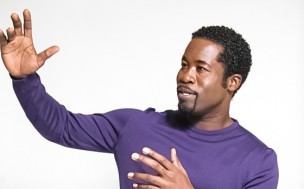Trauma and healing form the foundation of poet Daniel Beaty’s stellar slam.
On Thursday night, a group of Wesleyan students performed slam poetry in the CFA Hall with the help of visitor Daniel Beaty, whose stay on campus included performances at a number of events throughout the week. Audience members laughed with and cheered for performers as the room became a collision of heart-wrenching emotion and mind-blowing talent.
Some of the students filing into the CFA, both performers and audience members, came from a small dinner and workshop that Beaty had hosted beforehand. During the workshop, he asked participants to take a traumatic or influential event from their pasts and address it in their poetry, exploring the questions of how to move forward, what happens next, and how to find the virtue in struggle.
Jonah Toussaint ’17, who attended the workshop and performed at the slam, recounted his experience.
“I didn’t know what Daniel meant by ‘transformative’ until I felt a unique feeling of joy and sorrow as poets from around the room read their works aloud,” Toussaint said.
After a brief introduction from CFA Director Pam Tatge, Beaty opened the night with a slam poem of his own, which was about his childhood and relationship to his father. It began in song and then broke into a sort of rhythmic chant, during which he used the repetition of the phrase “Knock, knock” contrasting the game his father played with him as a child with his attempts to communicate with his father through a prison cell door. The piece set the tone for the night, where many students slammed about personal topics close to their hearts.
In Beaty’s poetry, he maintains a certain level of formality, even when his tone and volume escalate or the rhythm loosens. He demonstrates a powerful stance, shoulders squared, and slams with a deliberate, direct voice and clearly enunciated sounds.
After his own piece, Beaty handed out a blank piece of paper, instructing students who wanted to perform to add their names to the list. He clarified that this was not a competition, and that it was a completely open space. Students could recite poems they’d already performed, changing or adding aspects if they wanted, or explore new pieces they were working on. Many performers went onstage with phones or pieces of paper in hand and gave short prefaces about the topics of the pieces or the stage of the writing process they were in.
Altogether, 10 students performed in a whirlwind of emotion and personal exploration. Topics included gender norms, race, childhood, romance, and identity, and all were addressed with relatable, expressive tones and phenomenal creative skill. Beaty maintained a casual atmosphere where it would be difficult to fear going up on stage, and sustained a high level of creative energy.
As in most poetry slams, the audience played an integral part in the event. Beaty repeatedly reminded us between sets to cheer for the performers “like they’re Beyoncé” and encouraged the performers to feel the love and support emanating from the audience. Performers themselves were also part of the audience before and after performing, blurring the lines between observer and observed, and thereby bringing the audience even closer to the performance itself.
Beaty’s visit also included a production of his play, “Mr. Joy,” in which he plays 10 different characters; a 20-person breakfast and discussion on activist self-care; and a conversation about race and class in America held in Malcolm X House.
The visit impacted students intensely. Hailey Broughton-Jones ’18 felt the time she spent with Beaty exposed her to the connection between activism and personal stories.
“During his residency, Beaty helped guide us through utilizing the personal narrative to embrace the complexity of pain and vulnerability, while serving as the foundation for productive action,” Broughton-Jones said.
Broughton-Jones attended all of the events of the weekend, and she performed a piece at the slam called “White Soap” that addressed the hypocrisy of mottos like “embrace your curls” or “escape restriction” and how they are only considered acceptable for white girls’ hair.
Many of the pieces focused on love and romance, weaving other aspects of self-image, race, gender roles, and identity into the performances. One by Ainsley Eakins ’18 combined humorous, relatable references with powerful statements about consent and the objectification of women. The piece enacted what Broughton-Jones describes about the power of the personal narrative, utilizing a personal story as a filter through which to address more general topics.
In another equally striking piece called “A Letter to Short-Lived Love,” Destiny Polk ’19 recounted the ways that a brief romance has affected her life, both in her own relationships and in those of the people around her, including her parents. Refracting the same topic through multiple angles, both positive and negative, she proclaimed, “This letter is a ‘fuck you’ and a ‘thank you.’”
While this event was only a piece of Beaty’s visit, it demonstrated the quintessential combination of creativity and openness that he brought to campus over the past few days. It also spoke to his humility and sincerity: While he opened the night, he left the rest to the students he had been teaching throughout that evening, taking the focus away from himself and prioritizing these talented individuals.
“Having Daniel with us was incredible,” Toussaint said. “I’m grateful for the experience, and I hope that he comes to visit again soon.”

Comments are closed